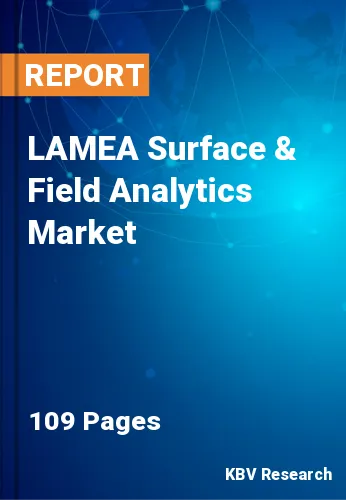The Latin America, Middle East and Africa Surface & Field Analytics Market would witness market growth of 15.6% CAGR during the forecast period (2022-2028).
A significant driving force behind the market is the expansion of nanotechnology research as well as the significance of surface & field analysis in semiconductor and life sciences. However, many industries recognize the significance of advances in surface & field analysis and the impact it has on better product performance as the better opportunities for the market. Government expenditures in smart cities around the world are having a favorable effect on the growth of the surface & field analytics market due to rising urbanization and technological advancements. Numerous sectors are increasingly contributing to the cost of geospatial technology research and development (R&D), opening up new market expansion prospects.
A digital system that can efficiently manage data in a user-friendly way is necessary for the successful deployment of smart cities, which is fostering the industry's expansion. An additional factor driving the market expansion is the increasing IoT (Internet of Things) integration with the product to gather and analyze data on water and air quality planning an urban environment in favorable conditions. Surface & field analytics is quickly gaining traction due to the interactive GIS graphic's ability to visualize urban components, allowing users to update and track static as well as dynamic data. This supports the market's expansion.
The Brazilian government announced a nationwide mapping & remote sensing program in 2016 to promote innovation and progress in the nation's use of geospatial imagery. The Brazilian government has also created an organization known as the Brazilian Institute of Geography and Statistics, which is in charge of collecting, analyzing, creating, and disseminating statistical data as well as geographic, cartographic, geodetic, and environmental information. Conclusively, it can be said that in this region, the demand for surface & field analytics is highest from the governmental organizations. In the coming years, the demand for these technologies and solutions will also emerge from other sectors. These factors present a promising growth opportunity for the regional surface & field analytics market.
The Brazil market dominated the LAMEA Surface & Field Analytics Market by Country in 2021, achieving a market value of $795.6 million by 2028. The Argentina market is anticipated to grow at a CAGR of 16.2% during (2022 - 2028). Additionally, the UAE market would showcase a CAGR of 15.3% during (2022 - 2028).
Based on Component, the market is segmented into Software, and Services. Based on Vertical, the market is segmented into Smart Cities, Energy & Utilities, Natural Resources, Automotive & Transportation, Defense & Intelligence, Government, Insurance, and Others. Based on Organization size, the market is segmented into Large Enterprises, and SMEs. Based on Deployment Mode, the market is segmented into On-premise, and Cloud. Based on countries, the market is segmented into Brazil, Argentina, UAE, Saudi Arabia, South Africa, Nigeria, and Rest of LAMEA.
Free Valuable Insights: The Worldwide Surface & Field Analytics Market is Projected to reach USD 36 Billion by 2028, at a CAGR of 9.3%
The market research report covers the analysis of key stake holders of the market. Key companies profiled in the report include Bruker Corporation, Carl Zeiss AG, Danaher Corporation, JEOL Ltd., Nikon Corporation, Olympus Corporation, Shimadzu Corporation, Thermo Fisher Scientific, Inc., Waters Corporation, and ULVAC-PHI, Inc. (ULVAC, Inc.)
By Component
By Vertical
By Organization size
By Deployment Mode
By Country
Our team of dedicated experts can provide you with attractive expansion opportunities for your business.

